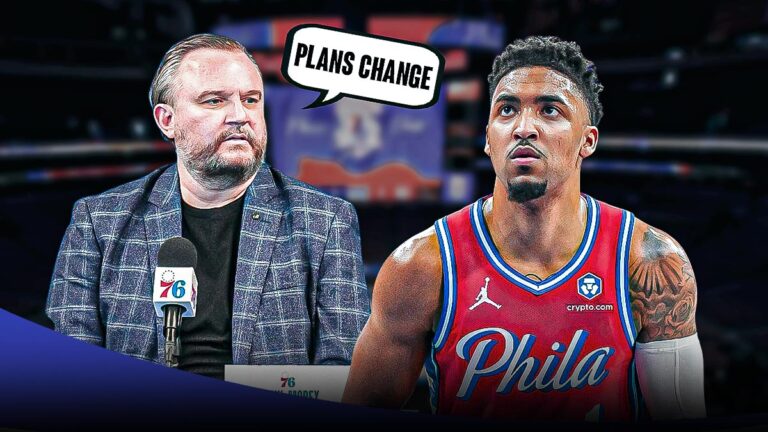They expected to witness Daryl Morey’s strategic offseason maneuvering pay off, with the team leveraging Martin’s increased cap hit to acquire a solid playoff contributor.
However, instead of securing a player like Nico Batum or a sharpshooter like Seth Curry, the 76ers ended up sending Martin to Detroit for cash while also attaching two second-round picks to persuade the Pistons to take the deal.
So, what went wrong? How did the situation unravel so dramatically for Philadelphia? According to Morey in his post-trade deadline media session, the team’s priorities shifted, leading to Martin’s departure.
“With KJ, we both felt [in the offseason] he could help us and would be a potential path for us to upgrade the team, primarily this year,” Morey stated via the Philly Voice. “But [as the trade deadline neared] we were sort of looking at a holistic plan of both getting younger, getting players we think are ones that can help us now and into the future, and also create flexibility to keep the key players on this team going forward. And we prioritized that over what KJ, CBA-wise, was able to do from a trade perspective to upgrade the team.”
Many fans have since pointed out that the biggest beneficiaries of this trade were the 76ers’ ownership group, as moving Martin’s contract provided no cap relief for the 2025-26 season since his deal was non-guaranteed. Making matters worse, this wasn’t the only second-round pick Philadelphia sacrificed, as they later lost another one in a separate deal with the Mavericks.
Why Did the 76ers Adjust Their Dallas Trade Compensation?
During the same media session, Morey elaborated on why the team had to surrender a third second-round pick, explaining that their negotiations with Dallas evolved due to concerns over Caleb Martin’s health.
“Long-term, there’s agreement that he’s fine. Both the Dallas and Philadelphia medical staffs had many discussions about where Caleb’s at, which happens as part of a trade. There’s still full agreement on where he’s at,” Morey explained. “He has sort of a nagging sort of injury. He was scheduled to play for us. Dallas is concerned that it’s uncertain how soon he’ll be back. They were concerned that that nagging injury might last a little longer than anticipated. But long-term, everyone agrees he’s fine, which is why the trade went through. But to acknowledge that, ‘Hey, you might not have this guy on day one,’ that’s where we amended the trade, and it went through.”
On the bright side, the 76ers exited the deadline with a net gain of two second-round picks after a late deal with Washington. Unfortunately, this came at the cost of a future first-round pick, which could prove costly in the coming years—unless Jared Butler develops into a legitimate contributor as the team’s fourth guard.
